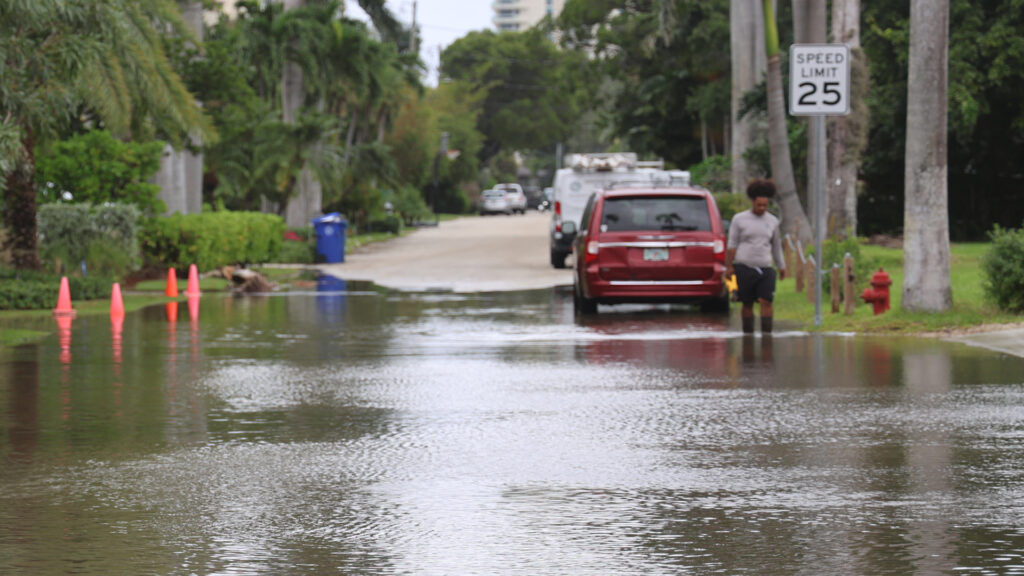By Amy Butler, Florida Atlantic University
South Florida is no stranger to flooding. The area’s flat topography and its proximity to the Atlantic coast make it highly susceptible to tidal flooding. But the devastating flooding from king tides in the past several years has given many residents a glimpse of what Florida’s future could look like as sea levels continue to rise.
King tides occur three to four times annually, usually during the spring and fall, and can quickly flood low-lying coastal landscapes. As Palm Beach, Broward and Miami-Dade are among the state’s most densely populated counties, there are multiple causes for concern when it comes to tidal flooding. In addition to affecting lives and livelihoods, king tides also put pressure on stormwater systems, roadways and other critical infrastructure.
Natural environments feel the powerful impacts of extreme flooding as well. Rising sea levels and king tides may contribute to saltwater intrusion into coastal aquifers, which threatens freshwater resources. South Florida’s stunning sandy beaches are also disappearing. To date, over 400 miles of coastline have been critically eroded due to tidal events.

“King tides, which are higher-than-normal high tides, occur due to the combined gravitational forces of the sun, moon and Earth when they are aligned,” explained Rebecca Clark, Schmidt College of Science Center for Environmental Studies (CES) graduate research assistant and geosciences Ph.D. candidate. “King tides usually happen during a new or full moon and can be exacerbated when the moon is at perigee — when it is closest to the Earth in its orbit — and when the Earth is at perihelion — when the Earth is closest to the sun in its orbit.”
To compound the matter, climate change will affect sea level rise and will cause king tide events to become more frequent and more severe. The Southeast Florida Regional Climate Compact projects that sea-level will rise of 10 to 17 inches by 2040 in their most likely scenario, which would significantly exacerbate king tide flooding in the region.
“While storm surges are different than king tides, they can contribute to even higher water levels and more severe coastal flooding when coupled with high tide events,” stated Clark. “As the climate warms, storm intensity and frequency will increase, causing the potential for higher impacts to king tides in the future.”
As part of her role, Clark also assists CES with king tide and coastal flooding education and outreach projects. She also works with FAU’s The Invading Sea website, which is managed by CES, to produce videos and articles. The CES team has started collaborating with the city of Boca Raton’s Office of Sustainability to plan outreach, education and citizen science events for local students and the community about the impacts of coastal flooding, including hands-on learning experiences at Rutherford Park in Boca Raton.
In Broward County, Florida Atlantic partnered with the Museum of Discovery and Science to launch a new exhibit, “Making Florida Resilient,” which invites guests on an interactive journey into the realities of climate change and the innovative solutions poised to shape a more sustainable future. CES is working to photo document, observe and map king tides in downtown Fort Lauderdale to determine areas where inundation is common during these events.
In addition, CES helps Florida Atlantic’s associate vice president for academic affairs, Broward campuses, to create educational videos about “Everything You Wanted to Know About King Tides.” The series features experts in community resilience, climate change and sea level rise and aims to educate the public, stakeholders and decision makers about the impacts of climate change and king tides.
The FAU Center for Environmental Studies manages and the FAU Charles E. Schmidt College of Science provides support for The Invading Sea. This piece was originally published at https://www.fau.edu/science/news/educating-the-community-about-king-tides/. Banner photo: Another image of CES staff measuring water levels during king tide flooding.
Sign up for The Invading Sea newsletter by visiting here. To support The Invading Sea, click here to make a donation. If you are interested in submitting an opinion piece to The Invading Sea, email Editor Nathan Crabbe at ncrabbe@fau.edu. To learn more about king tides, watch the video below.



